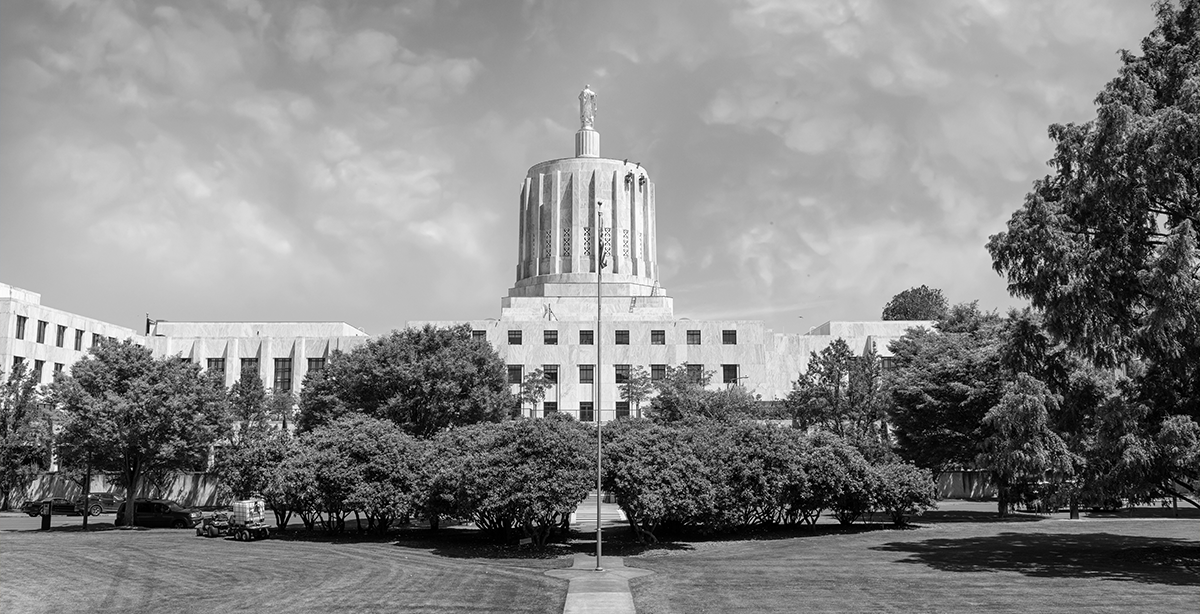The Oregon Legislature adjourned the long 180-day session on June 27, 2025. The legislature introduced 3304 bills, with 351 being signed by Governor Tina Kotek (D). While most priorities were settled, the Legislature failed to pass funding for the Department of Transportation, leading to Governor Kotek calling for a special session, which began on August 29.
Here’s what you may have missed:
Data Centers
Oregon is a growing hub for data centers. Several companies in the technology industry have established data centers in Oregon in the past due to cheap hydropower energy, but growing energy demands may force them (and other companies) to expand or create new ones. Potential data center expansion led to the introduction of the POWER Act to create new rate classifications.
HB3546, introduced by Representative Pam Marsh (D), requires the Public Utility Commission to provide a classification of service for retail electric consumers who are large energy facilities. Such a classification must be distinct from existing commercial or industrial consumers. Large energy users are required to sign a 10-year contract to pay a minimum amount for energy and transmission. The bill was signed by Governor Kotek (D) on June 16 and is effective immediately.
Supporters of the POWER Act argue it requires large energy users to pay their “fair share”. Representative Pam Marsh (D) said that increasing energy demand is “unique and requires a distinct solution.” Upon signing the measure, Governor Kotek said the bill will help lower household energy costs.
Critics argue that the new rate classification will lead to slower data center development and may disincentivize them from coming to the state.
Similar legislation has been introduced and passed in Maryland and Virginia. Similar energy planning legislation for data centers has passed in Indiana, Utah, and West Virginia.
Housing
Housing is a priority issue for Governor Kotek. During the State of the State Address, she spoke on the need to improve access to housing to reduce homelessness.
Five bills were introduced and passed to meet this goal:
- HB2138 – Allows cities to create zoning options for affordable housing, duplexes, triplexes, and quadplexes that are attached dwellings
- HB3031 – Establishes a housing infrastructure financing program
- HB2258- Allows the Land Conservation and Development Commission to adopt rules requiring local government to issue a land use decision to approve residential developments
- HB3145- Allows the use of the Local Innovation and Fast Track Housing Program Fund for factory-built housing
- SB684 – Amends the definition of residential housing to include certain mixed-income housing
Governor Kotek approved the bills during a ceremonial signing on July 28. She said they would help improve housing affordability, cut red tape, improve infrastructure, and reduce homelessness. These bills were supported by the Oregon Home Builders Association, who argue they will reduce permitting and bring more housing to the market.
Budget
The Oregon Legislature adopted a two-year budget valued at $138.9 billion, a 6% increase from the 2023-25 budget.
Funding was provided for the following:
- $29 billion to the Oregon Health Authority for Medicaid funding
- $231 million to the Higher Education Coordinating Commission for the Opportunity, Promise, Tribal Student, and National Guard tuition grants
- $149 million to the Department of Emergency Management for the 9-1-1 Emergency Program
- $35 million to the Department of Veterans’ Affairs for the construction of housing
While the final budget was passed on June 27, 2025, uncertainty remains. In May, the revenue forecast found there would be $755 million less than forecasted due to federal policy changes. While the Legislature was able to overcome this, recent reports suggest Oregon’s economy may slow down with a potential $888 million revenue loss in the next two years. This was somewhat anticipated, as $472 million was set aside to meet expected federal losses.
Special Session
Near the end of the 2025 Legislative Session, controversy arose when 11 Republicans boycotted session and called for a censure of Senator Chris Gorsek (D) after he acted “aggressively” towards Representative Shelly Boshart Davis (R) during a meeting over a transportation funding bill. This boycott ended when Senator Gorsek resigned as chair of the committee.
This controversy partially led to the initial transportation funding bill not being passed. Legislators were recalled to Salem by Governor Kotek to pass a new bill providing funding to the Oregon Department of Transportation.
This special session began on August 29 and adjourned on October 1. HB3991, passed during the special session, provides increased funding to the Oregon Department of Transportation through new motor vehicle taxes and increases to existing ones, such as the gas and vehicle registration tax. It passed both chambers and is eligible to be signed by Governor Kotek.
Republicans have expressed frustration with the tax increases. They plan to introduce a ballot measure to repeal increases from HB3991 if it is signed into law.
Conclusion
Compared to the 2023 Legislative Session, this one was far less controversial, with the only notable conflict being the call for censure of Senator Gorsek.
Legislative committee days, which act as interim hearings, began at the end of September. Committees have met to discuss climate change, energy, Medicaid, health care uses for artificial intelligence, autonomous vehicles, and pharmacy benefit manager practices.
The next election in Oregon will be held in 2026. Fifteen seats in the Senate and all sixty seats in the House are up for election. The Governor’s seat is also up for election. Oregon does not have gubernatorial term limits, so Governor Kotek may run again.
Oregon’s next session is the short 35-day session meant to lay the groundwork for the 2027 Legislative Session and make corrections to existing laws. This session begins February 2, 2026.
